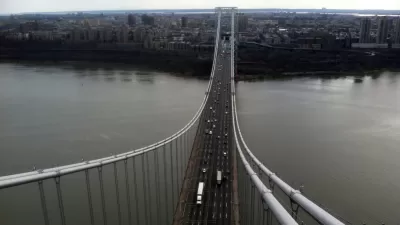Attorneys representing the state of New Jersey responded to the allegations of a class action lawsuit rising from the "bridge-gate" scandal.
Paul Berger digs into court documents filed Tuesday on behalf of a slew of defendants, including the state of New Jersey and the Port Authority," in response to a "class-action lawsuit filed on behalf of Bergen County commuters and taxi drivers who were stalled in traffic when two Fort Lee access lanes to the George Washington Bridge were closed without notice in September 2013."
The lawsuit has brought renewed focus on "Bridge-gate," with the back and forth between lawyers providing some perspective about the way the public thinks about traffic. "The class-action suit was filed at the beginning of 2014 on behalf of commuters and taxi drivers who say they used gas, lost time, and suffered emotional and economic damages because of delays caused by the closure of two of the three access lanes to the GWB in Fort Lee" according to Berger. In response, the defendants' case sums up like so: "You can’t sue for getting stuck in a traffic jam."
One class action lawsuit has already been tossed out of court. U.S. District Judge Jose Linares in June dismissed a case involving the same parties pack in August. The plaintiffs were, however, offered a chance to resubmit its case with additional facts to support its claims.
FULL STORY: Lawsuit over GWB lane closures assailed in court filings

Planetizen Federal Action Tracker
A weekly monitor of how Trump’s orders and actions are impacting planners and planning in America.

Chicago’s Ghost Rails
Just beneath the surface of the modern city lie the remnants of its expansive early 20th-century streetcar system.

San Antonio and Austin are Fusing Into one Massive Megaregion
The region spanning the two central Texas cities is growing fast, posing challenges for local infrastructure and water supplies.

Since Zion's Shuttles Went Electric “The Smog is Gone”
Visitors to Zion National Park can enjoy the canyon via the nation’s first fully electric park shuttle system.

Trump Distributing DOT Safety Funds at 1/10 Rate of Biden
Funds for Safe Streets and other transportation safety and equity programs are being held up by administrative reviews and conflicts with the Trump administration’s priorities.

German Cities Subsidize Taxis for Women Amid Wave of Violence
Free or low-cost taxi rides can help women navigate cities more safely, but critics say the programs don't address the root causes of violence against women.
Urban Design for Planners 1: Software Tools
This six-course series explores essential urban design concepts using open source software and equips planners with the tools they need to participate fully in the urban design process.
Planning for Universal Design
Learn the tools for implementing Universal Design in planning regulations.
planning NEXT
Appalachian Highlands Housing Partners
Mpact (founded as Rail~Volution)
City of Camden Redevelopment Agency
City of Astoria
City of Portland
City of Laramie



























